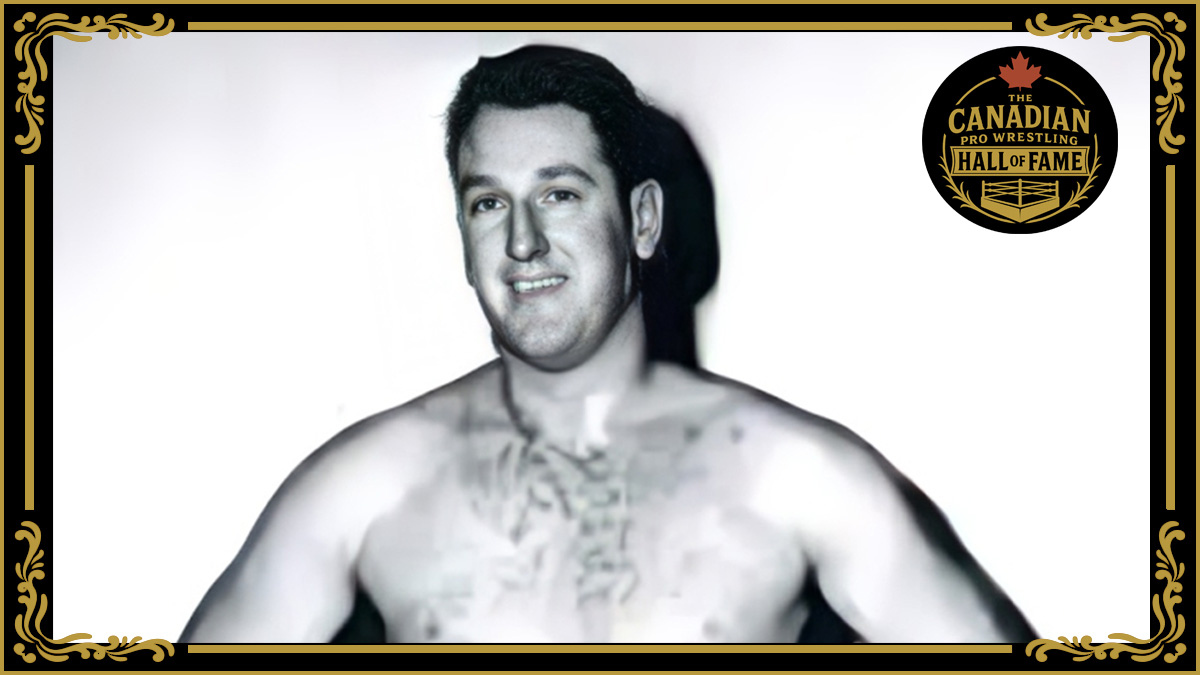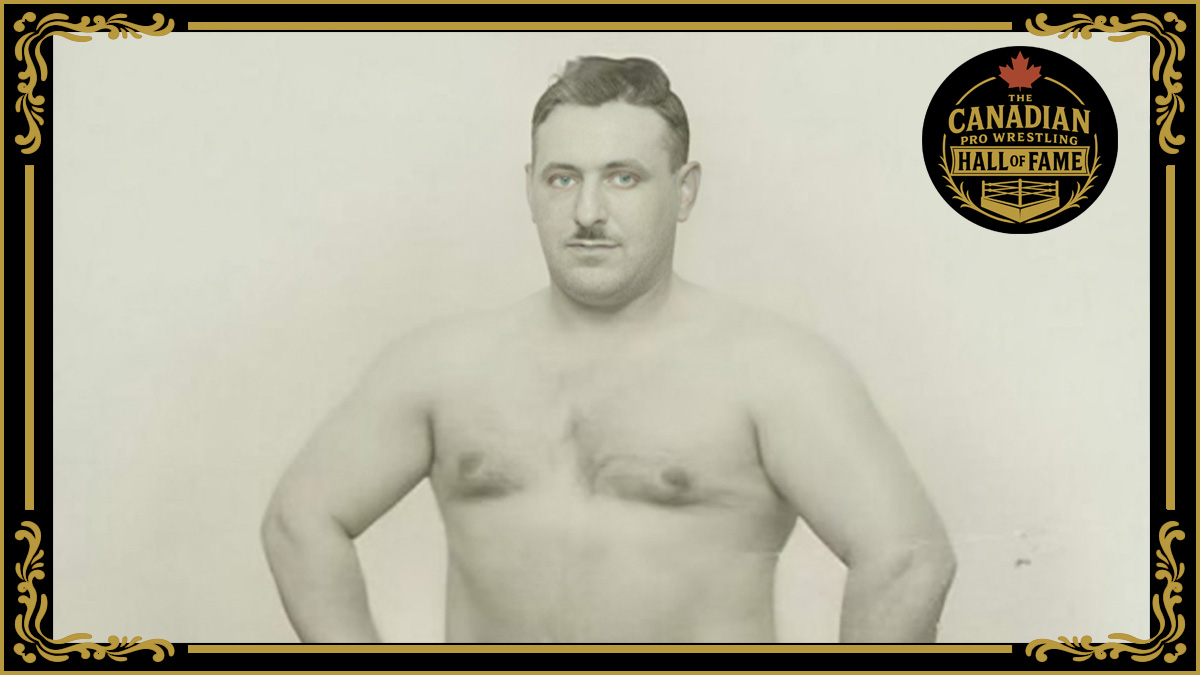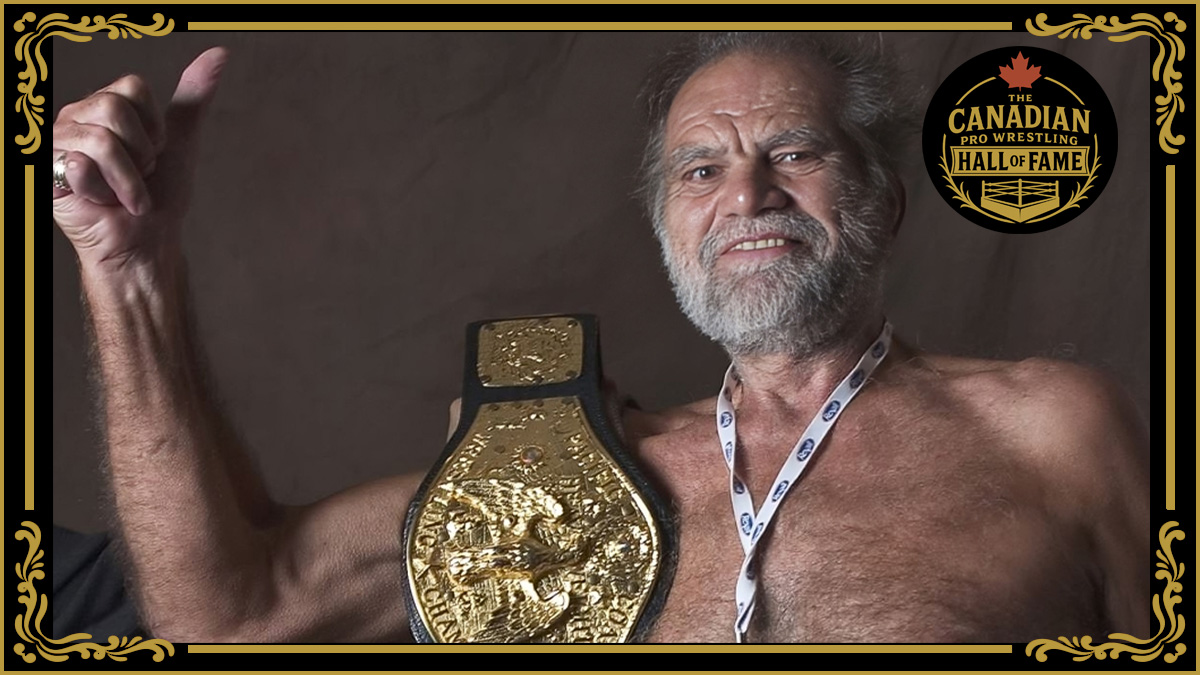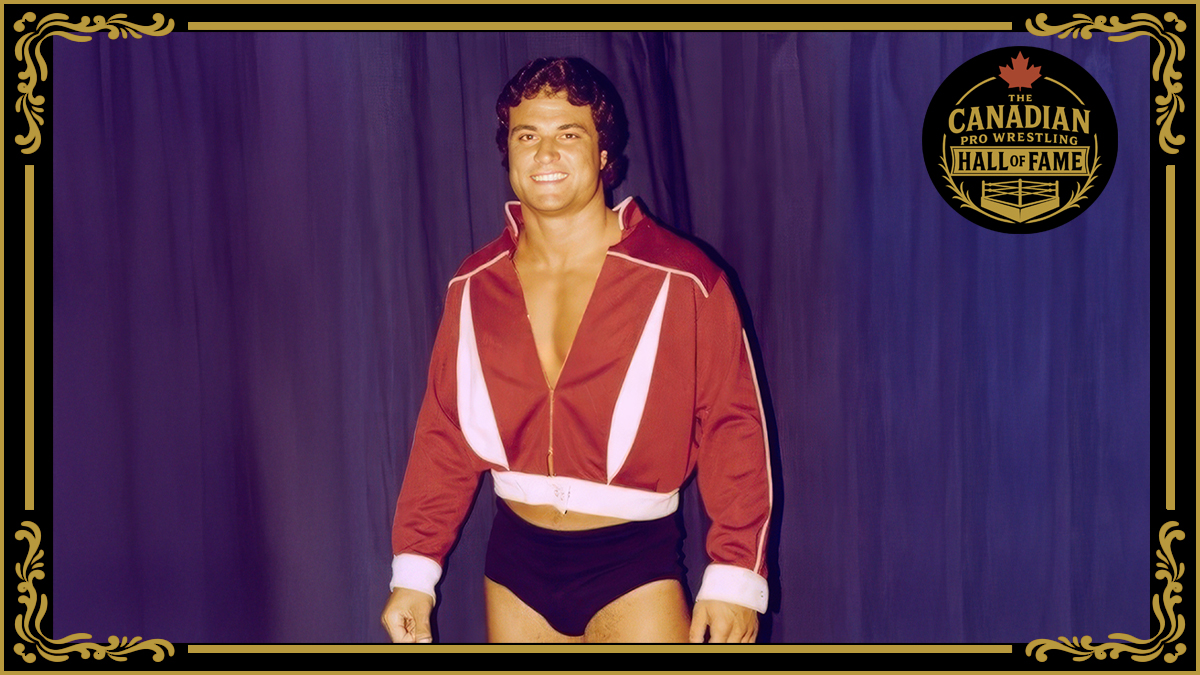If there was ever a classic example of a professional wrestler fading into the desert after the lights were dimmed at centre ring for the last time, Canadian Dave Sims would hold that distinction with little opposition.
Perhaps because he was known as one of the most honest and unassuming wrestlers in the game’s golden age, the enviable career of Sims has gone largely unnoticed and remains relatively unknown.
But in the 1950s throughout North America, Sims established a solid reputation as a sound, technical mat man who enjoyed main event billing for much of his career. Even though he achieved less notoriety than many of his contemporaries from that era, Sims was a major force in the pro ranks in the Central States and holds the distinction of battling Lou Thesz on three separate occasions.
He left a proud legacy from his days in the ring and his life outside the ropes was equally as satisfying as a result of sound business investments. He continues to enjoy life in retirement at age 84 in Las Cruces, New Mexico, where he decided to settle down after the final bell rang on his career. But even from the opening bell in his life, it was pre-ordained that young Sims would live a nomadic lifestyle in one form or another.
Anyone who has ever attempted to research the careers of professional wrestlers from the kayfabe era of the game will readily agree that sometimes the combined investigative skills of the RCMP and FBI would be more than welcome. This story is made possible with the help of the Pinkertons — not the world famous detective agency — but rather a proud and noble family with roots in Ireland, Canada and the United States.
The story of Dave Sims begins in Belfast, Ireland where he was born David Pinkerton in 1925. Dave’s parents immigrated to Canada along with his siblings when he was five years old. The family landed on Canadian soil at Quebec City, eventually making their way up to Toledo just outside of Smiths Falls, Ontario, where they took up homesteading, even though his father had been a jeweler in Dungannon, Ireland and his mother, who was well educated, taught typing and shorthand.
By all accounts the family prospered, eventually owning two homes and moving into the larger community of Smiths Falls where they settled into a normal lifestyle and enjoyed the frigid Canadian winters. But by 1940, the world had changed and particularly for the Pinkertons when Dave and his older brother Bill enlisted in the Royal Canadian Navy. Bill was 18 but Dave, only 17, lied about his age to enlist. They spent the next five years in the service of their adopted country. Serving on different ships, the brothers rarely saw each other.
Dave was a radar operator on a destroyer ship that escorted supply convoys. His main responsibility was detecting depth charges. He took part in the D-Day invasion of Normandy.
After the war, both brothers now in their early twenties, returned to Smiths Falls to pursue careers in civilian life. Their individual interests would steer them in different directions.
“I liked hockey,” Bill Pinkerton recalls. “After the war, I played a bit of hockey with the Smiths Falls Rideaus and once played the senior Ottawa Senators team. We had a lot of good players around town including Don McKenney who went on to play for the Boston Bruins. But Dave never played much hockey.”
In fact, younger brother Dave was more interested in amateur wrestling and had pursued that sport since age 12 with the local boys and girls club. Before he enlisted in the service he was runner up in a light heavyweight competition for Ontario.
After the war, Bill got into the oil industry with Gulf Oil. While Dave was trained as a barber, he was not about to put down roots in the small Eastern Ontario railroad town. It wasn’t long before he headed to Hamilton, Ontario, where he became involved in the very active wrestling scene in the city known as a hotbed for wrestling talent. He soon came in contact with Jimmy “Red” Sims, a veteran grappler and instructor who trained Billy Red Lyons, Skull Murphy and Johnny Foti, among others in the finer points of the game.
“I was a good amateur wrestler and Red liked my potential so he took me under his wing. Later, when I turned pro in 1947, he gave me the name Dave Sims and I became his ‘ring’ brother,” said Dave Pinkerton.
It’s not well recorded how successful the Sims brothers were as a team but by 1951, Dave was wrestling solo in Ohio towns such as Toledo, Lima and Sandusky, and for Al Haft in Columbus. He was being hyped as the brother of veteran Red Sims.
In 1952, he was at the top of his game, working in the Central States throughout Kansas and Missouri. He was meeting top notch opponents such as Sonny Myers, Bobby Lane, Ernie Dusek and Wild Red Berry. A year later he defeated Lane for the Heart of America Heavyweight Title. Dave’s grandson, Terrance Ward tells an interesting story how the title changed hands.
“When Dave met Lane for the title it was understood that Bobby would come out on top. Dave was okay with that but apparently Lane didn’t like the fact that Dave had progressed so quickly in his career and decided to teach him a lesson,” Ward said. “Bobby started to pull a few dirty tricks and hurt Dave intentionally. So Dave decided to forget about the prearrangement. When the opportunity presented itself, Dave pulled a fast one and pinned Lane for the win and the title.”

Sims lost the title later that year to Lenny Montana in Wichita, Kansas. By 1954, the championship was renamed the Central States Heavyweight Title and Dave once again lay claim to the belt, defeating the respected Sonny Myers. Later in the year he lost it to Bob Orton Sr. in Kansas City, Kansas.
Sims was by now well established and traveled to territories in Iowa, Nebraska, Minnesota and Winnipeg, Manitoba, as well as Texas where Dory Funk Sr. and Dirty Dick Raines became regular foes.
When asked who he considered his toughest opponent, he had no hesitation in naming Lou Thesz. Perhaps he reached that conclusion after Thesz beat him on three separate occasions.
“I received $4,400 for meeting Thesz in 1953 in Kansas City, Kansas,” Dave proudly recalled. “At that time prelim guys were getting maybe $300. Thesz always said you had to be tough to get the main events. You had to look after yourself and put on a good show for the people.”Thesz also came out on top in their second encounter in Wichita, Kansas, in 1954. The final match was also won by Lou in February 1955 in El Paso, Texas, at the Coliseum. Sims had Thesz in a death grip but the wily veteran hit him with a closed fist that the referee neglected to catch. Thesz walked away with what newspaper accounts called a “disputed decision.”
True to form in the kayfabe era, promotional material churned out in other territories would claim Sims held Thesz to one-hour draws on three separate occasions. Several thousand yellow brick miles from Kansas, who knew otherwise? By the mid-1950s, Sims and his family were residing in El Paso and owned a motel that wife Julie operated. He was a good headliner wherever he appeared and would draw crowds of 3,000. At 6-foot-1, 230 pounds, he was tall, tanned and handsome and an instant hit with the ladies. He often cashed in on his popularity with marketing ploys by offering free tickets or red roses to the first 500 ladies in attendance. He became a big fan favourite in Texas, New Mexico, and even south of the border where he often appeared in Juarez, Mexico.
But his Canadian roots were never ignored completely. For many summers in the 1950s, he traveled to North Bay, Ontario, to work for Larry Kasaboski’s Northland Wrestling Enterprises. Sims referred to the trip as a summer vacation since it afforded him the opportunity to escape the sweltering Texas summer heat. At the same time there was money to be made on the circuit and Dave and many others welcomed the attractive situation.
He was a natural to headline shows in Brockville, Renfrew and Smiths Falls where he was hailed as the hometown hero. He was an Ottawa Valley boy, as was Kasaboski, and the pair took full advantage of their local connections. In North Bay, Sims moved into a two-storey house on Lake Nipissing each summer and also had another house on the double lot.
Often he entertained his brother Bill and his family. Both brothers had a great love for pickerel fishing and Lake Nipissing was the ideal place for a day of wetting a line for walleye. “One time,” Bill Pinkerton recalled, “Dave was offered a large sum of money — could have been $1,000 — to appear in a show in Carleton Place but he turned it down, preferring to go pickerel fishing on the lake.”
But when he did appear in Valley towns, he gave fans more than their money’s worth. “I remember one match in Smiths Falls when Dave took on Elephant Boy,” Bill said. “It was a brawl. They fought in the ring, on the floor, in the seats, all over the arena. The fans loved it.”
Elephant Boy and Sims were well acquainted with each other, having battled in various North American rings. Tony Olivas presented a fierce persona with his Afro hairdo which was an oddity in small town Ontario in the 1950s. Other formidable talents on the circuit on Sims visits were Dirty Don Evans, Tony Morelli, Luther Lindsay, Dory Funk Sr., and Reggie Siki.
One prolonged feud in Pembroke had Sims battling meanie Karl “Crusher” Kawalski for five weeks. Three single matches between the bearded, bald Kawalski failed to bring closure to the simmering feud. Since interest was at a peak, the promoter kept the turnstiles open for this one. Only when barefoot Len Rossi teamed with Sims and the mysterious Elephant Boy joined forces with Kawalski, was the grudge finally ended, in favor of Sims and Rossi quite naturally.
But there were times when Dave, it seems, had his mind on pickerel fishing rather than on the match at hand. In a rowdy match in Timmins, Ontario, he and partner Bill Curry were thoroughly thrashed by the team of Gorgeous George Grant and Leo “The Lion” Wallick. The newspaper account of the match is most revealing:
“Bill Curry was dynamic. But partner Sims did more arguing with referee Tony Faletti than fighting. While the two villains were ganging up on Curry, Sims fought with his lips flapping rather than jumping into the ring and performing as he really can,” the reporter noted with a touch of northern sarcasm.
The popular Curry is one of the few remaining workers from that period still residing in North Bay. He recalled Sims with fondness. “Dave Sims was one of the nicest guys in the business. For the life of me, I don’t know how he got involved in the wrestling game,” said Curry.
Although she was only four years old, a niece, Susan Doyle, also has fond memories of her uncle Dave. She vividly recalls attending a match with her father Bill, to watch her uncle in action at the Smiths Falls arena.
“After his match was over, Uncle Dave, dressed in a suit, came out to sit with us at ringside. He picked me up and placed me on his knee. We were close to the timekeeper’s table and Dave asked me if I wanted to ring the bell. After the match, when I rang the bell, one of the wrestlers jumped out of the ring and approached my uncle in a menacing manner. He commenced shouting at Dave and threatening to do him harm the next time they met. As he continued to yell at Dave, I started to yell back, waving my finger and warning the wrestler not to yell at my uncle. Everyone laughed, amused at the bravery of a four year old. But the wrestler, sensing that I was upset, leaned in closer and assured me that he and my uncle were really friends, then proceeded to walk away. I was never a big fan, but I always remember that night.”
Eventually Sims stopped making the long trek to Northern Ontario, and the Canadian contingent of the family only saw him at funerals or special occasions. Bill Pinkerton now resides in Nova Scotia as does his daughter Susan.
“One time I arranged to have a special Dave Sims Day for him in Smiths Falls,” recalled Bill. “Everything was set up but he wasn’t interested in that sort of thing.”
In 1959, Dave sold the motel in El Paso and moved to Las Cruces, New Mexico, where he purchased two service stations. He continued to wrestle until 1965 when at the age of 40 he decided he had enough of the road and the ring. His intention was to retire back to Canada, but an interesting job proposal was made to him in Las Cruces.
He was hired as property manager at the First National Bank and remained there for 20 years, rising to the position of Executive Vice-President. He became an American citizen and legally changed his name to Dave Sims. Dave kept in shape and looked after himself after his ring days. He was an avid golfer and worked out in the gym regularly, which he still does, twice a week. When he worked at the bank, he opened up a gym in the basement of the 10-storey building. Since the bank was owned by a state Senator, Dave called it the Senators Gym. Somewhere along the way, he also bought a pecan farm which is now looked after by his grandson Terrance.
The wrestling business spawned a special breed of men after World War II. Many veterans returning from the war had no desire to settle down to a regular 9 to 5 job. Sims fit quite well into the category of wanderer. Born in Ireland, raised in a small Canadian town, he had little hesitation in hitting the road to seek his fame and fortune.
No doubt there are some who still remember the quiet Canadian who came from Smiths Falls to make his mark in the heart of America. The battles have long since been won on the beaches of Normandy and in the wrestling rings of the nation. The winds have finally died down in Kansas.
Dave Sims is quite at home now in Las Cruces among family and friends, pleased to reminisce about pickerel fishing on Lake Nipissing and traveling the winding roads of Northern Ontario.
It is a way of life perhaps forgotten by the majority but still cherished by the few.




